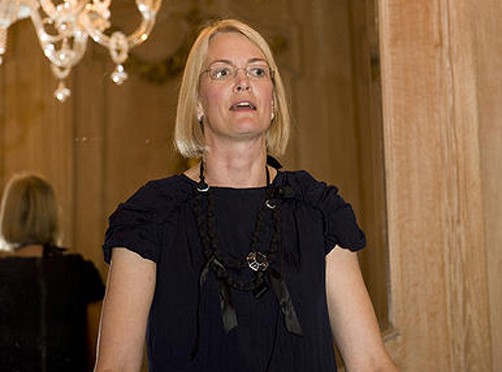
Margot James: Tories to ‘nudge’ change in NHS
pharmafile | July 5, 2010 | News story | Medical Communications, Sales and Marketing | NHS, government, pm society
Speaking to the industry for the first time since being elected as Conservative MP for Stourbridge at the recent General Election, Margot provided the PM Society audience with insight into the new coalition government’s key priorities, and her views on the future of the NHS and the role of the industry in the new healthcare agenda.
Margot began by saying that although political life was now her sole purpose, the pharmaceutical industry remained very important to her and has a very special place in her heart. Since she founded Shire Health in 1986, Margot said that the developments in the industry had been phenomenal. In 1986, Tamoxifen for breast cancer had not yet been launched, and a lack of treatments for mental health conditions such as schizophrenia meant patients could only be treated in mental institutions. These extraordinary changes have come about thanks to pharmaceutical industry R&D, and she said the sector should be proud of what it had achieved in this time.
However, she added that the UK regulatory burden is now so great that the country is haemorrhaging its clinical research base to Eastern Europe and the Far East; something that health secretary Andrew Lansley wants to address in order to retain the clinical research base in the UK.
NHS and pharma – partnership potential
Turning to the huge changes to the NHS instituted by the Labour government in the 1997-2010 period, Margot said she believed Labour’s first few years turned the clock back on NHS reform, and only since 2002 have reforms moved it forward. Many years and structural reforms later, she said the NHS is virtually back to where it was in 1997.
Margot talked about how the NHS fitted in to David Cameron’s wider vision for the country as a whole. The new government wants to devolve greater power and responsibility to citizens and professionals, empowering them to take control over their lives and have greater choice, with less state interference.
Policies on healthcare and the NHS fit in to this wider vision. Professionals will have far greater scope to use their own judgement. They will be free to exercise judgement in the interests of patients rather than in response to Whitehall driven targets. The NHS will be held accountable by outcomes and less by process driven targets.
Patients and families too will have a greater say, the service will be accountable to patients at a local level. She said Andrew Lansley had a passion for the NHS and great knowledge, having been shadow health secretary for six and a half years.
Speaking about what opportunities there might be for industry, Margot believes pharma has huge experience to offer the NHS, not just in the supply of medicines, but to helping it with the reforms it is undergoing. She believes opportunities exist for industry and the NHS to work together in a number of areas including:
• Data collection and analysis put at the disposal of NHS
• Value-based pricing
• The ability to work positively with NICE
• Clinical research and development
She believes NICE will move on from producing individual audits of a drug’s clinical and economic benefit, towards assessing the overall management and treatment options in a disease area. Andrew Lansley has said that it is ‘scandalous’ that patients don’t have access to certain modern treatments that are available elsewhere in Western Europe, notably new cancer drugs.
Margot predicts that NICE’s remit will change. The government wants to see improvements in patients access to medicines, therefore purely looking at the most ‘cost effective’ options and individual drug assessments would no longer be its focus. Lord Howe will have responsibility for NICE and any changes in restructure and remit within the government.
Margot went on to say that she thinks that David Willetts, the minister for Business Innovation and Skills with responsibility of higher education and science will be important for the pharmaceutical industry. Calling Willetts a thoughtful and considered person, she said he would be looking to build evidence based policies, and will allow scientific advisors to express their views. Margot said that the government wants the pharma industry and life sciences to get the support they need in order to retain the world class reputation the UK has for scientific research and development.
The future of NICE and UK pricing
When asked whether she though the PPRS pricing scheme would be renegotiated, Margot said that “yes” she thought it would. Although was not certain who would oversee this, though Andrew Lansley would undoubtedly be involved in such negotiations himself.
She confirmed that the new government wanted to get more dynamism into the delivery of public services.
In healthcare the government aims to hand commissioning to primary care and reduce the role of PCTs. The aim is to foster ‘localism’ and devolve decision-making and create a framework that ‘nudges’ change but does not enforce it.
The way in which we are going to see real change will be to release resources from hospitals and to reduce management layers throughout the NHS, said Margot. On the question of closure of community hospitals or closure of A&E and maternity wards, Margot said Lansley takes a very cautious view on closures. She said there had been too many examples of hospitals closing on the theory their work could be channelled elsewhere, only for the reality to prove the opposite.
Margot James MP
Elected as Conservative MP for Stourbridge in the May 2010 election, Margot James has been involved in politics since her student days when she was chairman of the London School of Economics Conservative Association and worked as a researcher for Sir Anthony Durant MP.
In 1986 Margot co-founded her own company, Shire Health, a PR and medical education business. Shire Health was voted ‘Consultancy of the Year’ three times and Margot was voted Communicator of the Year in 1997. After twelve years running the business, Margot sold Shire Health to the WPP Group and was appointed Head of European Healthcare for WPP’s advertising agency Ogilvy & Mather. Margot has for many years been involved in the voluntary sector and the NHS. She served on the board of Parkside NHS Trust for four years and has worked as a Mental Health Manager. For 10 years she was a trustee of African women’s charity Abantu, and trained women from more than 40 different African countries in communications and lobbying skills.
In 2005 Margot was appointed to the position of vice chairman of the Conservative Party for women’s issues. She formed the Women’s Policy Group under the chairmanship of Eleanor Laing MP and is contributing to the policy review process underway in the Conservative Party.
Related Content

A community-first future: which pathways will get us there?
In the final Gateway to Local Adoption article of 2025, Visions4Health caught up with Julian …

The Pharma Files: with Dr Ewen Cameron, Chief Executive of West Suffolk NHS Foundation Trust
Pharmafile chats with Dr Ewen Cameron, Chief Executive of West Suffolk NHS Foundation Trust, about …

Is this an Oppenheimer moment for the life sciences industry?
By Sabina Syed, Managing Director at Visions4Health In the history of science, few initiatives demonstrate …






